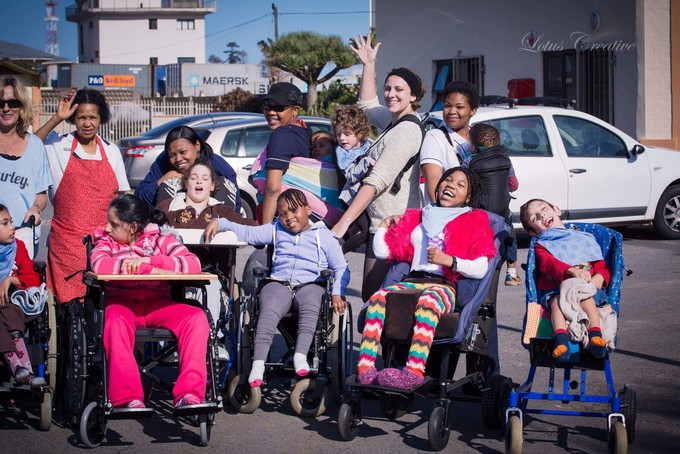Thousands of children with disabilities are not receiving the Care Dependency Grant
And the R2,180 monthly amount is too little to cover the costs of caring for a child with disabilities

Caregivers and the children at Canaan Care Centre in East London going for a walk. Archive photo (2016) supplied.
- Many children who are probably eligible for the R2,180 per month Care Dependency Grant are not receiving it.
- 165,000 children receive the monthly grant, but many others are probably eligible.
- Potential beneficiaries of the grant find the application process overwhelming and difficult to navigate.
The Care Dependency Grant, for guardians of children with disabilities who are in need of full-time care, is not reaching enough children, and it is not enough to cover care needs. The grant is currently valued at R2,180 a month.
Dr Zara Trafford, senior researcher at Stellenbosch University’s Institute for Life Course Health Research, said the uptake of the Care Dependency Grant is very low. About 165,000 people in South Africa receive the grant.
It is difficult to estimate how many children in South Africa would qualify for the Care Dependency Grant because there is no accurate incidence rate of childhood disability. The most recent StatsSA disability report, from 2014, estimates 718,409 people under the age of 19 live with disabilities. But there are caveats: children under the age of five with psychosocial or neurological disabilities were not counted, and there are indications that some parents may have misreported certain categories.
Trafford said few people are aware of the grant and that there is confusion around the criteria for eligibility. The Social Assistance Act, which governs the Care Dependency Grant and other social grants, originally said the grant was for children with “severe” disabilities. The word “severe” was later dropped from the Act, but it remains on many government websites that describe the grant.
“Severe disability” is not a reliable concept, says Trafford. Any child who needs full-time care should be eligible, she said.
As part of the application process, potential beneficiaries are expected to undergo disability assessments conducted by a doctor. Doctors registered with SASSA to conduct these assessments are few, said Trafford. This causes application backlogs. A 2023 research paper by Trafford and Professor Leslie Swartz found that doctors conducting disability assessments are often overloaded and “have been inserted into a large system that is focused on grants administration”, without specific interest or training in social security or social assistance.
Sabrina Chalmers, operations manager at Gabriella Centre, a day care facility for children with disabilities, says the means test required as part of the eligibility criteria alienates some potential beneficiaries.
“Many families may assume they are ineligible without fully understanding the specific income thresholds, or they may find the process of proving their financial status too cumbersome. This can discourage them from even attempting to apply,” said Chalmers.
The application process is complicated and should be streamlined, she said. Many applicants do not have the necessary resources or support systems to go through the application process.
In order to apply, people are required to visit many different places in person: Home Affairs for identity documents, public hospitals for medical assessments, banks to open accounts, and SASSA offices to apply. “This can be overwhelming for families already stretched thin by the demands of caring for a child with disabilities,” said Chalmers.
She said the grant falls short of “covering the full spectrum of care needs for children with disabilities”.
Chalmers said the costs of transport, specialised care, medical treatments, and assistive devices can “far exceed the monthly grant amount.”
Care is so expensive that people even over the income threshold of R223,200 a year for a single person or a combined household income of R446,400, may still need support, said Chalmers, and it should be adjusted.
The grant is rarely enough to employ professional carers, Trafford said. Instead, the grant often replaces the income of mothers who are unable to work because they need to care for their children full-time. Most early childhood centres and schools do not cater for children with disabilities and parents prefer to stay at home with their children.
She recommends that recipients of the Care Dependency Grant also be eligible to receive the Grant in Aid, which is aimed at adults on the Old Age and Disability grants who require full-time care, or the Child Support Grant. Both these grants are valued at R530 a month and the Child Support Grant reaches 13.2-million children.
Current regulations prohibit recipients of the Child Support Grant from also accessing the Care Dependency Grant. Development Pathways has found that many children with disabilities are accessing the Child Support Grant and not the Care Dependency Grant.
SASSA and the Department of Social Development did not respond to GroundUp’s questions sent a week ago.
Support independent journalism
Donate using Payfast

Next: Court orders Gauteng government to pay non-profit organisations
Previous: Three years after a court order, illegal dumps in Makhanda have not been cleared
© 2024 GroundUp. This article is licensed under a Creative Commons Attribution-NoDerivatives 4.0 International License.
You may republish this article, so long as you credit the authors and GroundUp, and do not change the text. Please include a link back to the original article.
We put an invisible pixel in the article so that we can count traffic to republishers. All analytics tools are solely on our servers. We do not give our logs to any third party. Logs are deleted after two weeks. We do not use any IP address identifying information except to count regional traffic. We are solely interested in counting hits, not tracking users. If you republish, please do not delete the invisible pixel.
